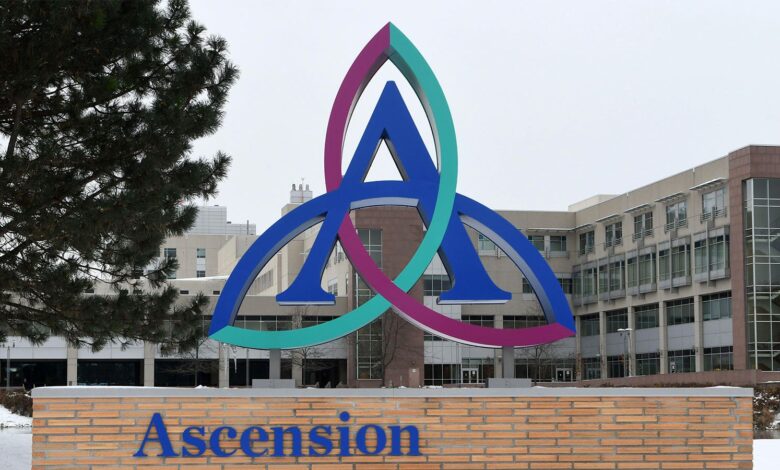Cyberattack on Ascension Diverts Ambulances, Takes EHRs Offline

—
Experts say ransomware attacks have increased in recent years, especially in healthcare
by
Associated Press
May 11, 2024
A cyberattack on the Ascension health system operating in 19 states across the U.S. forced some of its 140 hospitals to divert ambulances, caused patients to postpone medical tests, and blocked online access to patient records.
An Ascension spokesperson said it detected “unusual activity” Wednesday on its computer network systems. Officials refused to say whether the non-profit Catholic health system, based in St. Louis, was the victim of a ransomware attack or whether it had paid a ransom, and it did not immediately respond to an email seeking updates.
But the attack had the hallmarks of a ransomware, and Ascension said it had called in Mandiant, the Google cybersecurity unit that is a leading responder to such attacks. Earlier this year, a cyberattack on Change Healthcare disrupted care systems nationwide, and the CEO of its parent, UnitedHealth Group, acknowledged in testimony to Congress that it had paid a ransom of $22 million in bitcoin.
Ascension said that both its electronic health record (EHR) system and the MyChart system that gives patients access to their records and allows them to communicate with their doctors were offline.
“We have determined this is a cybersecurity incident,” the national Ascension spokesperson’s statement said. “Our investigation and restoration work will take time to complete, and we do not have a timeline for completion.”
To prevent the automated spread of ransomware, hospital IT officials typically take EHRs and appointment-scheduling systems offline. UnitedHealth CEO Andrew Witty told congressional committees that Change Healthcare immediately disconnected from other systems to prevent the attack from spreading during its incident.
The Ascension spokesperson’s latest statement, issued Thursday, said ambulances had been diverted from “several” hospitals without naming them.
In Wichita, Kansas, local news reports said that local emergency medical services started diverting all ambulance calls from its hospitals there Wednesday, though the health system’s spokesperson there said Friday that the full diversion of ambulances ended Thursday afternoon.
The EMS service for Pensacola, Florida, also diverted patients from the Ascension hospital there to other hospitals, its spokesperson told the Pensacola News Journal. And WTMJ-TV in Milwaukee reported that Ascension patients in the area said they were missing CT scans and mammograms and couldn’t refill prescriptions.
Ascension said its system expected to use “downtime” procedures “for some time” and advised patients to bring notes on their symptoms and a list of prescription numbers or prescription bottles with them to appointments.
At two Wichita hospitals, staffers were forced to use pen and paper and announce medical emergencies over the PA system because their pagers were down, a spokesperson representing the union covering those hospitals’ employees told the Wichita Eagle.
Cybersecurity experts say ransomware attacks have increased substantially in recent years, especially in the healthcare sector. Increasingly, ransomware gangs steal data before activating data-scrambling malware that paralyzes networks. The threat of making stolen data public is used to extort payments. That data can also be sold online.
“We are working around the clock with internal and external advisors to investigate, contain, and restore our systems,” the Ascension spokesperson’s latest statement said.
In the Change Healthcare cyberattack earlier this year, hackers entered a server that lacked multifactor authentication, a basic form of security. It was not clear Friday whether the same group was responsible for the Ascension attack.
Change Healthcare provides technology used by doctors and other care providers to submit and process billions of insurance claims a year. The attack delayed insurance reimbursements and heaped stress on doctors’ offices around the country.
After hackers gained access in February, they unleashed a ransomware attack that encrypted and froze large parts of the company’s system.
Witty said the company’s core systems were now fully functional. But company officials have said it may take several months of analysis to identify and notify those who were affected by the attack.
They also have said they see no signs that doctor charts or full medical histories were released after the attack. Witty said the company, which UnitedHealth acquired in 2022, used data centers for some of its storage, but it would be moving into more secure cloud storage.
Witty told senators UnitedHealth is “consistently” under attack. He said his company repels an attempted intrusion every 70 seconds.
A ransomware attack in November prompted the Ardent Health Services system, operating 30 hospitals in six states, to divert patients from some of its emergency rooms to other hospitals while postponing certain elective procedures. It also suspended user access to information technology applications such as software used to document patient care.



